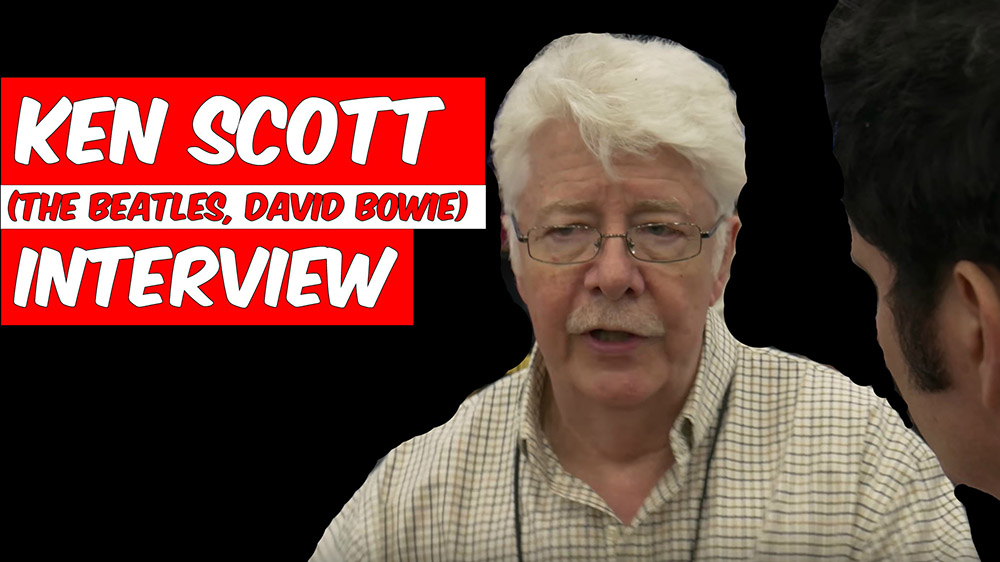We were able to talk about his start in the industry at EMI Recording Studios, which would eventually become Abbey Road. Working in the tape library, Ken recalls having held the 1″ 4-track tape of The Beatles’s “Can’t Buy Me Love” before the world had ever heard it! After some time, he was promoted to 2nd engineer (or “button pusher” as it was known in those days) and worked his first session on A Hard Day’s Night.
From 2nd engineer, Ken was promoted to disc cutting and finally to engineering. A trial-by-fire learning experience the whole way, Ken remembers sitting at the console, having no idea how anything worked, and engineering The Beatles track “Your Mother Should Know.”
Ken Scott notably produced David Bowie’s Hunky Dory and Ziggy Stardust.
Ken and I also spoke about David Bowie’s Hunky Dory, which, depending on the day of the week, is my favorite album ever. It’s truly a seamless blend of so many genres, and, according to Ken, was recorded in about two weeks at Trident Studios in London. Trident housed one of the 14 original Sound Techniques consoles on which the album was made! The same can be said for Ziggy Stardust–including the two-week tracking period. The industry certainly moved more quickly in those days!
Sound Techniques started as a small recording studio in 1964.
We also met with Danny White of Sound Techniques to learn about the company’s newest console and, of course, the history of the company itself. Sound Techniques began life as a London recording studio in 1964, opened and operated by two friends, Geoff Frost and John Wood. The pair didn’t have much money to invest in equipment, but they did have the talent to build it themselves!
Between 1964 and 1971, Geoff and John built the 14 original consoles that were available in 4-, 8-, and 16-track configurations. The Sound Techniques board would find itself in places like Sunset Sound and Elektra Sound Recorders in Hollywood; the aforementioned Trident Studios; and De Lane Lea Studios in London.
In addition, Sound Techniques offered the System 12 desk between 1969 and 1976. One of the world’s first compact consoles, The Rolling Stones purchased it for use on Goats Head Soup in 1972. The album was recorded at Dynamic Sound Studio in Kingston, Jamaica. From there, the System 12 also found its way to Joe Gibbs Studio and Randy’s Studio 17–both in Kingston.
In the ’60s and ’70s, so many phenomenal records were made on Sound Techniques boards. “Hey Jude” and tracks from the White Album, all the early Elton John, Bowie, and Queen records, as well as Pink Floyd and Jimi Hendrix albums, were either tracked or mixed on Sound Techniques desks. Many of which were also done at Trident Studios!
What’s next for Sound Techniques?
Danny and the new team have worked tirelessly to bring Sound Techniques into the 21st century. That is, while retaining the original sonics that made it onto so many classic albums. The brand new ZR desk is essentially a hybrid–old school and new–featuring faithful reproductions of the preamp and EQ circuits used in the original. Beyond the mic pres and EQs, the ZR is a thoroughly modern console.
The ZR console at a glance (from the company):
- Transformer mic amp with variable impedance
- Inductor-based EQ
- Inline monitor console (fader swap can route the available inputs to either fader)
- 6 Mono Aux Sends
- 2 Dedicated Foldback Sends with pan
- 8 Buss Console w/Direct outputs on all channels
- Moving Fader Automation System
Please enjoy this chat with Ken Scott and Danny White at NAMM 2018.
Have a marvelous time recording and mixing,
Warren Huart
